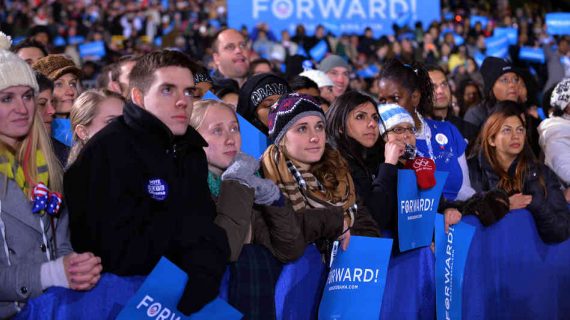Millennials Abandon Obama, at Least by Stupid Definition of ‘Abandon’
So, Dana Milbank has a column.
Dana Milbank‘s column headline “Why millennials have abandoned Obama” grabbed my attention in that there’s no evidence that they have.
The day before the Iowa caucuses in 2008, I wrote about the massive crowds of young people at Barack Obama rallies, noting that his candidacy would collapse “if they don’t show up.”
The next night, after Obama’s victory celebration in Des Moines, Obama strategist Steve Hildebrand spotted me in a crowd. “The kids showed up!” he said fiercely.
They did. But where are they now?
So . . . the evidence that the younger generation has “abandoned” Obama is that, whereas throngs of them showed up when he was a fresh-faced candidate offering hope and change at the tail end of eight years of Bush-Cheney, there are no crowds now that he’s a lame duck and, well, not running for anything? Surely, that’s not the basis for a column.
An army of 15 million voters under 30 swept Obama past Hillary Clinton and John McCain and to the presidency in 2008. More than 12 million helped him return in 2012. But now his presidency is on the line — and the Obama youth are abandoning him in his hour of need.
What, exactly, is it that the president needs a little over a year into his final term?
The administration announced last week that only 1.08 million people ages 18 to 34 had signed up for Obamacare by the end of February, or about 25 percent of total enrollees. If the proportion doesn’t improve significantly, the result likely will be fatal for the Affordable Care Act.
The administration had said it needed 40 percent of registrants in the health insurance exchanges to be young adults, or about 2.7 million of the expected 7 million total. Overall enrollment is also below target. But the alarming shortcoming is the number of young participants, which would make the insured population older and sicker and the program too expensive.
Wha . . . ?
First, it makes no sense whatsoever to assert that a generation has “abandoned” a leader on the basis of having twice voted for him overwhelmingly but then declining to buy some other product. If they’ve gone from being Obama loyalists to sending money to Marco Rubio or Ted Cruz, then I”m intrigued. But, not signing up for a program that costs money? Not so much.
Second, a full quarter of the enrollees in said program are in said generation.
Third, under Obamacare, those in the 18-27 demographic can stay on their parents’ insurance plans and thus have no need to sign up for Obamacare exchanges. And, of course, those with decent jobs will tend to have health coverage provided by their employers.
So . . . Milbank’s only evidence for “abandonment” is that the administration’s ideal generational breakdown for Obamacare exchange signups has not been achieved? Even though, I’m willing to bet, they were fully aware that their announced goals were wildly unachievable?
Uh huh.
It gets better.
Having utterly failed to demonstrate his premise, Milbank goes on to explain the generational dynamics behind it.
What went wrong? The president and his aides failed to keep his youth movement engaged. But part of the problem also is the inability of the millennial generation to remain attached to a cause. The generation that brought Obama to power is connected online but has no loyalty to institutions — including, it turns out, the Obama White House.
In 2008, “the level of innovation and engagement in the election, especially the primaries, was amazing, but then the level of engaging them during the administration was extremely disappointing,” says Peter Levine, a Tufts University professor who specializes in youth civic involvement. “He had a potential army for legislative success and implementation, but the Obama administration did not do that. At a critical moment in the first term, they did not turn to them. . . . They got rapid youth demobilization.”
Young voters, after playing a big role in the campaign, became little more than an e-mail list for the White House and Obama’s Organizing for Action group. Then came health-care reform. The millennials, very liberal overall, saw Obama’s plan as too timid; they were disillusioned by his failure to fight for the “public option” of government-run health plans.
So, let’s get this straight: After getting elected, the president just went ahead and governed rather than continuing his campaign? Aside from being relatively untrue—he continued in campaign mode much moreso than any of his predecessors—it’s a bizarre charge. Especially with regards to Obamacare, which wasn’t really the president’s plan at all but a mishmash cobbled together in the vain hope of attracting bipartisan support.
Even if Obama had worked harder to keep his youth army engaged, it’s not entirely clear that the effort would have succeeded. As a group, the generation’s attachment is fickle.
A Pew survey of the generation, released earlier this month, found the 18-to-33 crowd less attached than older generations to organized politics and religion, less patriotic, less eager to marry and less trusting of people. Only 49 percent say the phrase “a patriotic person” describes them very well, compared to percentages ranging from 64 percent to 81 percent for older generations.
And it goes without saying that religious patriots are precisely the sort of people most apt to sign up for government healthcare exchanges.
The millennials are at least as passionate as earlier generations and more entrepreneurial, but they lack ties to institutions — unions, political parties, churches — because of their online existence. “The organizational structure they’re growing up in is so weak,” Tufts’ Levine tells me. As a result, “there aren’t very many durable institutions that can capitalize on their enthusiasm. They’re being asked to do it themselves, online, and it’s a tall order.”
Although it would seem to make them perfect candidates to sign up for healthcare online, no?







Could someone explain this talking point to me? I’ve heard it a few times (CAMPAIGNER-IN-CHIEF!!!)but no one has ever bothered to define what they mean. I personally don’t see it so a little guiding hand would be nice.
@Matt: Obama’s 2008 campaign was a quantum leap in information operations and he transitioned it directly to the White House. While I criticized some manifestations of it at the time, it’s mostly not a critique but an observation. Ronald Reagan, Bill Clinton, and George W. Bush also took the info ops game to new levels. All, to some extent, took advantage of a better understanding of an emerging communications environment than others. For Obama, it was a quantum leap because of social media and big data.
I think it is probably fair to say that the blush is off the rose. Once elected, any president will have to compromise a bit, and wont be able to deliver on all the campaign promises. That said, I would agree that not signing up for health care is an odd metric to choose. OTOH, it is a useful metric to assess some beliefs about health care. For those who believed that making health care available and affordable would be enough to get people to sign up, they may want to question that assumption, though I would submit that it is a bit early to come to that conclusion.
Steve
When I was their age, in college, or just out, the last thing I thought about was health insurance, retirement plans, or savings. I was living at home, had a nice car, and would stuff paychecks into a drawer, sometimes to be forgotten for months. The economy was going well, jobs were easy to get, and inflation was not yet a problem. Todays “millenials” (or “Mosiacs” if you wish) are similar, yet in some ways are more conservative. Obama’s style, mind set, and strategies are far removed from todays youth. Young people are the force and makeup of the growing independent, conservative church movement, which is changing totally the religious landscape as the established mainline denominations of their parents are in total decline. They have changed the communications from desktop pcs to cell phones and ipads. Many do not have cars and don’t plan to have them. Most will never own a home. Political leaders might as well be on another planet.
While the health care startup had a lot of problem, the so called millenials are thinking completely away from accidents and health issues (it would help if the government would upgrade from those Commodore computers). This is a generation that was largely insulated from failure, grades below a C, and were protected from everything. There parents follow them to college to make sure they get to class on time, have all their needs, and to keep their teachers in line. Their parents have big homes so their children will always have a place to return. No empty nests any more.
Yeah, I had a similar reaction to this column yesterday , James, albeit for slightly different reasons. That the president’s approval rating has declined among Millennials is not exactly a state secret. However, I don’t think that’s particularly important for the mid-term elections.
What’s more important is who will turn out and in what numbers. Historically, young voters have been the hardest to get out to vote in mid-term elections. If that holds true this time around and the expected second term mid-term experience holds true, Democrats are likely to lose ground in both houses.
I continue to believe that Democrats will hold the Senate but the lower the president’s approval rating is the greater headwinds Democrats will face and the more difficult that will become.
What I would find more interesting is how young voters react to negative advertising in political campaigns. The prevailing wisdom is that it doesn’t depress turnout but does discourage the electorate about the value of their votes which I would think might influence younger voters more. I wonder if the effects are the same across the demographic spectrum.
Since modern campaigning largely consists in smearing your opponent in short television advertisements, if negative advertising depresses voter turnout among young voters, that could be a perverse strategy for Democrats since older, whiter voters are more likely to vote Republican.
proved to be nothing more than a retread of the same people he promised to be different than.
I fixed that paragraph for you.
@edmondo: If you can’t tell the difference between Obama and Bush-Cheney, don’t bother voting
@Tyrell: Yeah we are so conservative that Obama’s brand of centrism is too far left for us. That is why millennials make up such a huge base of the Tea Party movement. As to the church thing it is super hard to get those dang churches to bend to our will that according to a UC Berkeley study: “More than one-third of 18-to-24-year-olds claimed “no religion” compared to just 7 percent of those 75 and older.” Likely because we think those current churches are just too liberal in their support of gay marriage, abortion and equal rights. I guess a third of us just decided to have no religion than stick to those squishy leftwing institutions that are available. But hey this is just one guy’s opinion because having facts to back up crazy assertions was something my professors never asked for, especially after my mommy had to leave my dorm room to go yell at them for their grading policies. On the brightside she has a big basement for my continued existence so I’ll never have to grow up, and affords me the luxury of continuing my monetary support of my conservative heros: Palin, Trump, Huckabee, Paul, etc. When us millennials are finally in charge America will truly know the meaning of conservatism.
@Tyrell:
Before slamming a bunch of kids and their parents…you should try to learn the proper use of their, there , and they’re.
And enough with the stupid commodore joke. You are posting comments on the Government-developed internet.
On the positive side; I would like to know when the nirvana that was your youth took place.
I think that its no mystery why the President’s approval ratings are down, even among Millennials. Pundits like to talk about everything else but the economy-whether the President projects “strength” or the characteristics of “generation”, etc, but really, it’s the economy. The economy has been sick for a long time, and rightly or (mostly) wrongly, the public holds the President responsible for that.
I might seem like a broken record here, but the inadequate stimulus and the President’s messaging was really the original sin of the Administration, and he hasn’t been able to overcome that. The President has done many good things, but he doesn’t done the one big thing -restore the economy-and the millennials know that.
Also too, millenials know that the President’s vision was simply wrong. There really is a blue America and a red America, and the President really can’t convince red America ( which has the political power to block him) to go along with blue America’s vision. The millennials here aren’t stupid: they’re figured out the deal, which is the best case scenario is that Obama can do nothing more than simply defend his first term accomplishments. He can’t help them any more than that.
@C. Clavin: 1960’s -1970’s
@Tyrell:
So you would advocate a return to tax rates that ranged from 70 to 90% in order to re-establish that nirvana?
@OzarkHillbilly:” @edmondo: If you can’t tell the difference between Obama and Bush-Cheney, don’t bother
voting”Wasting our time with your trolling crap.
FTFY.
@C. Clavin: “On the positive side; I would like to know when the nirvana that was your youth took place.”
In Tyrell’s case, it seems to have been in 1911.
@C. Clavin: Actually things got pretty bad in the ’70’s: high interest rates 10-16% for a mortgage, rapid inflation, slowdown of the economy and layoffs, but not a lot of overseas competition had occurred yet (decline in textile industry was just starting). Certainly not a picnic perfect time. Lots of problems resulting from Vietnam. And the assassinations of the ’60’s: changed things forever.
My parents had a large basement. Big enough to ride bikes in when it was raining outside.
I am not slamming the millennials at all. Each generation has its own particular attributes and characteristics. What I have stated is what I have seen and what shows up in social articles about generations. Our generation, the baby boomers, did not follow their parents into church as they became adults – most baby boomers left the church. Baby boomers have also had the highest disposable incomes of any group – partly the result of the economy that our parents passed onto us. Real estate was almost always a sure bet. The baby boomer age has had its problems too: it was the age where divorce became common.
See: Slate: “Why millenials can’t grow up” Also: “The Mosiac Generation” at Regent.edu.
I sometimes misspell words: my eyes are not what they used to be.
@Tyrell:
A big indictment of parenting in America. Actually, I don’t know any parents who followed their kids to college to do any of what you said. This generation of children, like my generation, will just have to make their own way, and despite all the “get off my lawn” complaints, they’ll do just fine.
@OzarkHillbilly:
Excellent advice. I haven’t been in a voting booth since I got hoodwinked in 2008.
@al-Ameda: I know of one parent who did that a few years ago. I know another couple who are talking about it (the husband is saying “no way”)
And this is an article similar to others: canada.com see “helicopter parents follow kids to college, workplace…” from study by BYU in 2013. At one university parents got mad at the basketball coach and tried to get him replaced; over playing time.
@C. Clavin: “stupid Commodore joke”: I agree it is kind of corny. I knew some people who had Commodores; they seemed like good machines for the time.
Internet – great progress. Now if they will just ditch the telegraph keys and get telephones!
I am kind of rusty at Morse Code.
@Tyrell: You seem rather rusty at a lot of things….
@Tyrell: It’s great to know that you had a privileged life without a care or worry in college. Meanwhile I along with all the millennials I know are struggling to keep a roof over our head (two jobs donating plasma 2x a week etc) while paying our way through college. We don’t care for the Democratic party but we like the Republican party even less. In our view they are different sides of the same coin with the Democratic party only being somewhat more helpful to us. If I fail financially I have no home to return to.
Yeah there’s some conservative members but the majority are too liberal to be included in the Republican party (pro-choice to various degrees pro-gay rights pro-legalization). Even though I’m pro-gun rights and such I won’t vote Republican.
@C. Clavin: I along with many other millennials would love a return to that tax rate.
The commodore 64 was a top of the line machine for it’s time with features that were far ahead of most computers of the era.
EDIT : The Republican party lost me when they called me a traitor and freedom hater because I opposed the patriot act and various other similar bills and revisions. I also got the same treatment for opposing the war in Iraq. When the party of “freedom” starts actively taking those freedoms away then I have no interest in voting for them. At least the Democratic party will give me a reach around while screwing me….
Were you subject to the draft or were you a Fortunate Son?
http://www.youtube.com/watch?v=ec0XKhAHR5I
@ernieyeball: Yes, I was registered and subject. Then Richard Nixon started the numbers “racket”. I got a high number, but the draft ended anyway, as the Vietnam War was winding down with Nixon’s famous “Vietnamization” strategy.